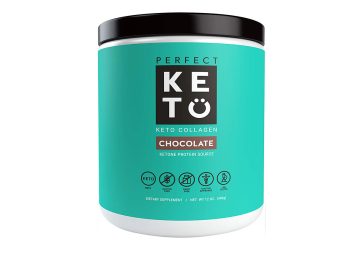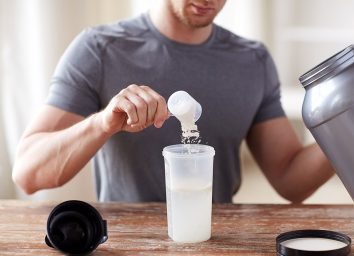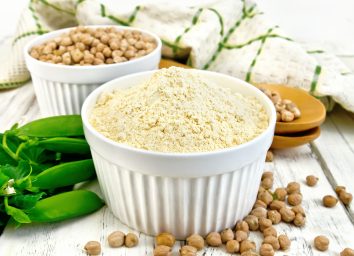9 Best Whey Protein Powders of 2019, According to RDs
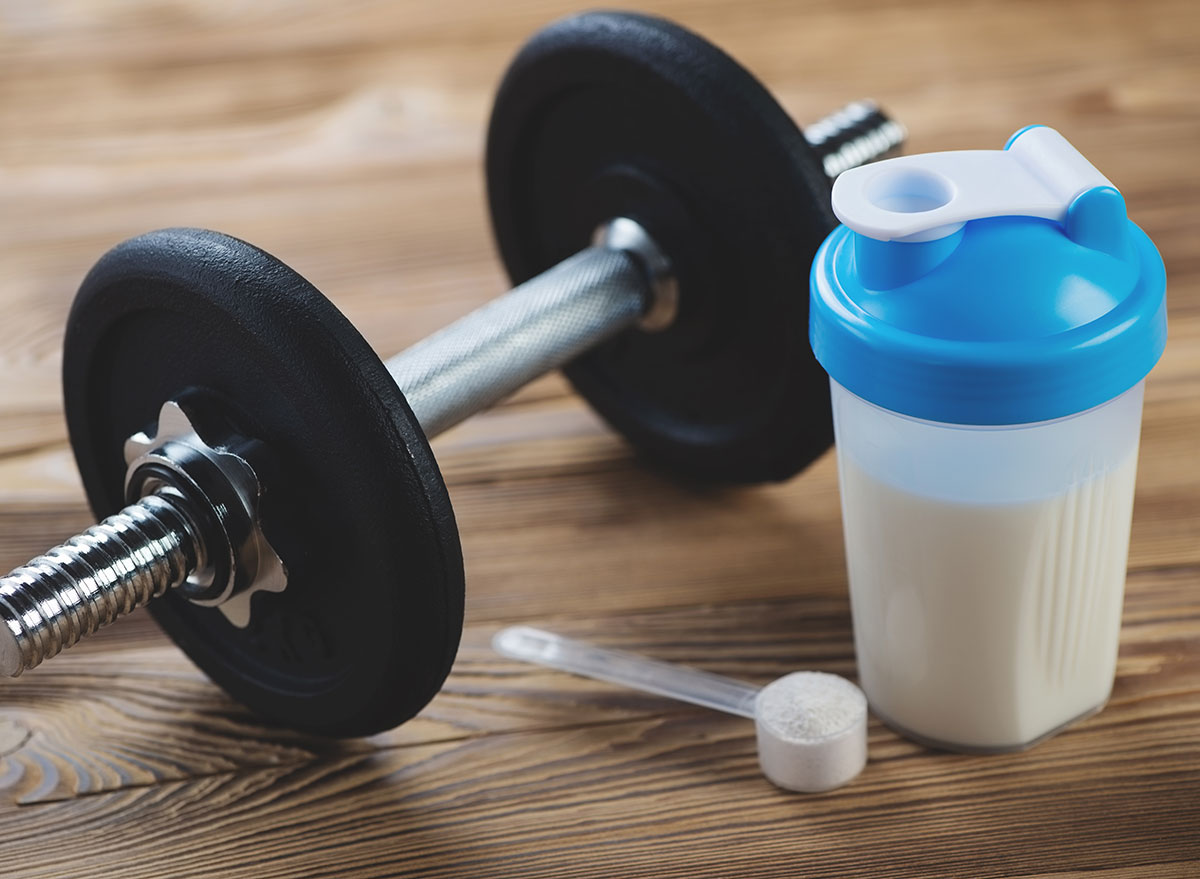
Everywhere you look, there seems to be a new protein powder on the market promising stronger muscles, less fatigue, and a slimmer waist. And while there are plenty of protein powders that can deliver on some of those promises, it is abundantly clear that not all of these enriched substances are created equal. That's why we asked nutrition experts for their guidelines to determine the best whey protein powders, as well as their go-to tubs.
What is protein powder?
Generally speaking, protein powders are concentrated sources of plant and animal protein that can be used to build muscle, repair tissue, help you meet nutritional needs, and add a satiating component to meals and snacks.
What is whey protein?
Whey is the watery portion of milk that separates from the curds when making cheese. Whey protein, specifically, is the predominant protein source in this watery whey mixture.
Whey is one of the most common protein sources available as a protein powder. It is a fast-acting protein that is highly digestible and broken down quickly, which provides a quick dose of amino acids that may help increase muscle mass and strength.
Dairy proteins, such as whey, are classified as "complete" protein sources, meaning they contain all nine essential amino acids.
What are the benefits of whey protein powder?
Given its composition, whey protein is commonly used for improving athletic performance and increasing strength. In fact, a 2017 study in the journal Nutrients found that whey protein supplementation enhances whole-body protein metabolism and performance recovery after resistance exercise.
In the double-blind crossover experiment that led to these findings, 12 trained men performed resistance exercise in the evening prior to consuming either 25 grams of whey protein or an energy-matched placebo immediately post-exercise and again the following morning. The results showed that those who ingested the whey protein experienced enhanced whole-body anabolism and improved acute recovery of exercise performance after a strenuous bout of resistance exercise.
Additionally, because of whey protein's dairy roots, it, along with other dairy products, may help lower blood pressure. One study in overweight individuals showed that ingesting 54 grams of whey protein a day for 12 weeks lowered systolic blood pressure by 4 percent.
What is the difference between whey protein concentrate and whey protein isolate?
For starters, it's crucial that you understand the difference between whey protein isolate and whey protein concentrate. Whey protein concentrate has a lower percentage of protein than whey protein isolate, and contains more bioactive compounds found in the milk fat that positively influences metabolism and immunity.
Conversely, whey isolate undergoes more processing than whey concentrate, which results in a higher protein content with less carbohydrates, lactose, and fat. Because whey isolate contains fewer carbs overall, it is also lower in those that often cause sensitivities. In other words, whey isolate is better suited for those with digestive issues. Still, because whey protein isolate and whey protein concentrate are derived from the same proteins, the types of amino acids found in both forms are virtually identical, meaning the health benefits are very similar.
How to pick the best whey protein powder.
Despite whey protein's many positive attributes, there are several factors to keep in mind when searching for a whey protein powder that's right for you.
- Look for short ingredient lists: Most RDs recommend protein powders that are free of additives like artificial sweeteners and dyes, carbs, added sugars, and so on. These ingredients are typically added to make protein powders look and taste more appealing, but they can often do more harm than good. Artificial sweeteners are particularly unhealthy, as they have been shown to contribute to increased bloating and weight gain. Furthermore, a study in the Yale Journal of Biology and Medicine found that artificial sweeteners, precisely because they are sweet, encourage sugar craving and sugar dependence.
- But make sure Branched Chain Amino Acids (BCAAs) are listed: BCAAs are a group of three essential amino acids—leucine, isoleucine, and valine—that have been shown to build muscle, decrease muscle fatigue, and alleviate muscle soreness. If you're in the market for a protein powder to use before or after a workout, this is especially important to keep in mind.
- Pay attention to the fiber content: "Fiber is a great addition to protein powders," says registered dietitian Amanda Baker Lemein, MS, RD, especially because most Americans aren't getting enough of the satiating substance. "Adding fiber to a protein powder means increased satiety for much longer versus the protein alone," she says.
- Opt for grass-fed over conventional: When picking a whey protein powder, the quality of the whey protein is an important factor to consider. Grass-fed whey protein has significantly higher omega-3 fatty acids as compared to whey protein that comes from grain-fed cattle, Keith Hine, MS, RD, and Senior Director of Healthcare & Sports at Orgain says. Grass-fed whey protein from New Zealand, in particular, is even higher quality. Because of the animal welfare regulations in New Zealand, the grass-fed cattle are not injected with hormones to increase milk production and are not unnaturally contained in feed lots, which can expose them to greater illness, heat, stress, and injury.
The following 9 best whey protein powders come recommended by nutrition and health experts. See what made the cut.
Beneprotein by Nestle Health Science
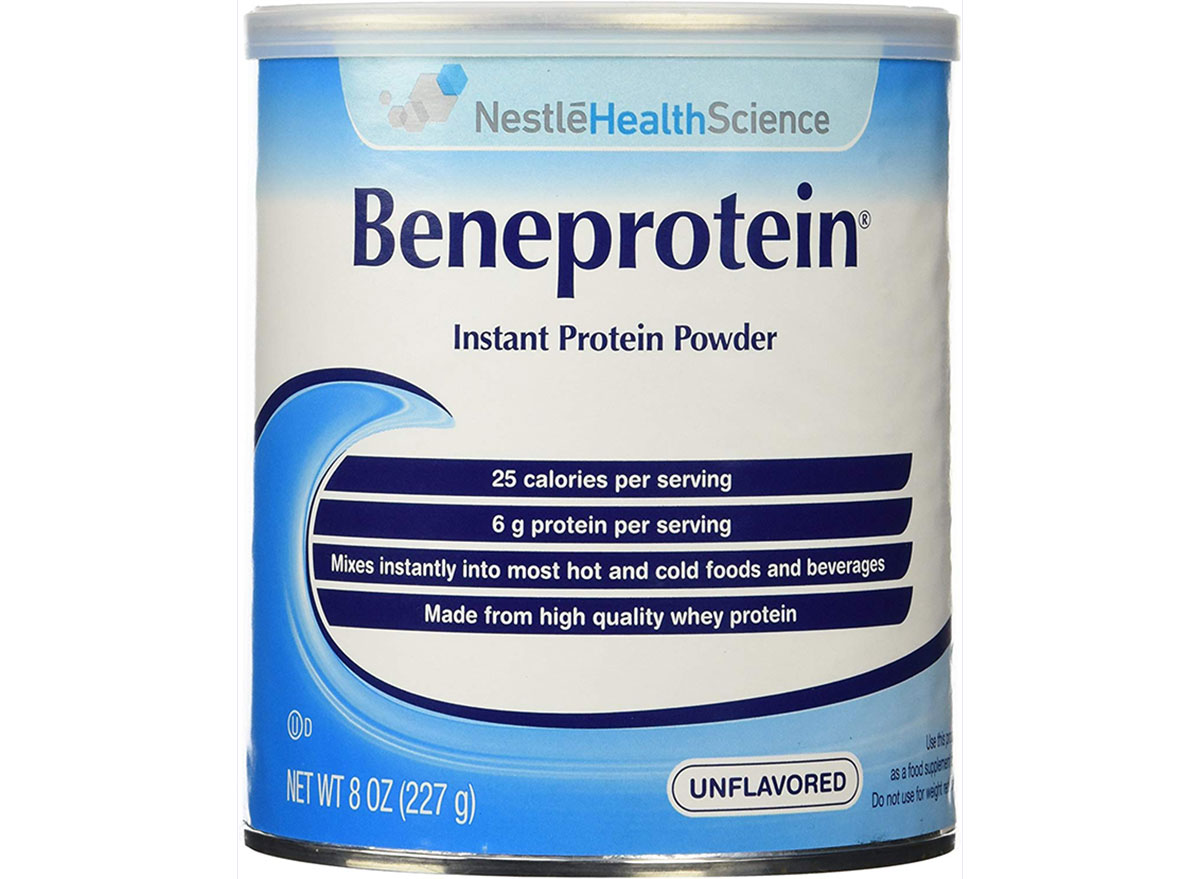
Sure, protein powders that come in scrumptious sounding flavors may seem enticing, but it can actually be more beneficial to seek out a "bare-bones" version, such as Beneprotein by Nestle Health Science, especially if you're partial to tossing your protein powder into a post-workout beverage or some baked goods. This powder consists of just two ingredients—whey isolate and soy lecithin—and contains no carbs, fat, or sugar.
"It has no flavor at all, which I like because I can cook and bake with it or throw into a smoothie to create my own flavors from cocoa, fruit, almond butter, and coconut oil," says Jim White, RD, ACSM, HFS, Owner of Jim White Fitness and Nutrition Studios. "Whey isolate is my favorite protein because it is the purest form of whey and is a complete protein. It contains all the essential amino acids that your body needs to repair muscle after a workout."
Jay Robb's Whey Protein Powder
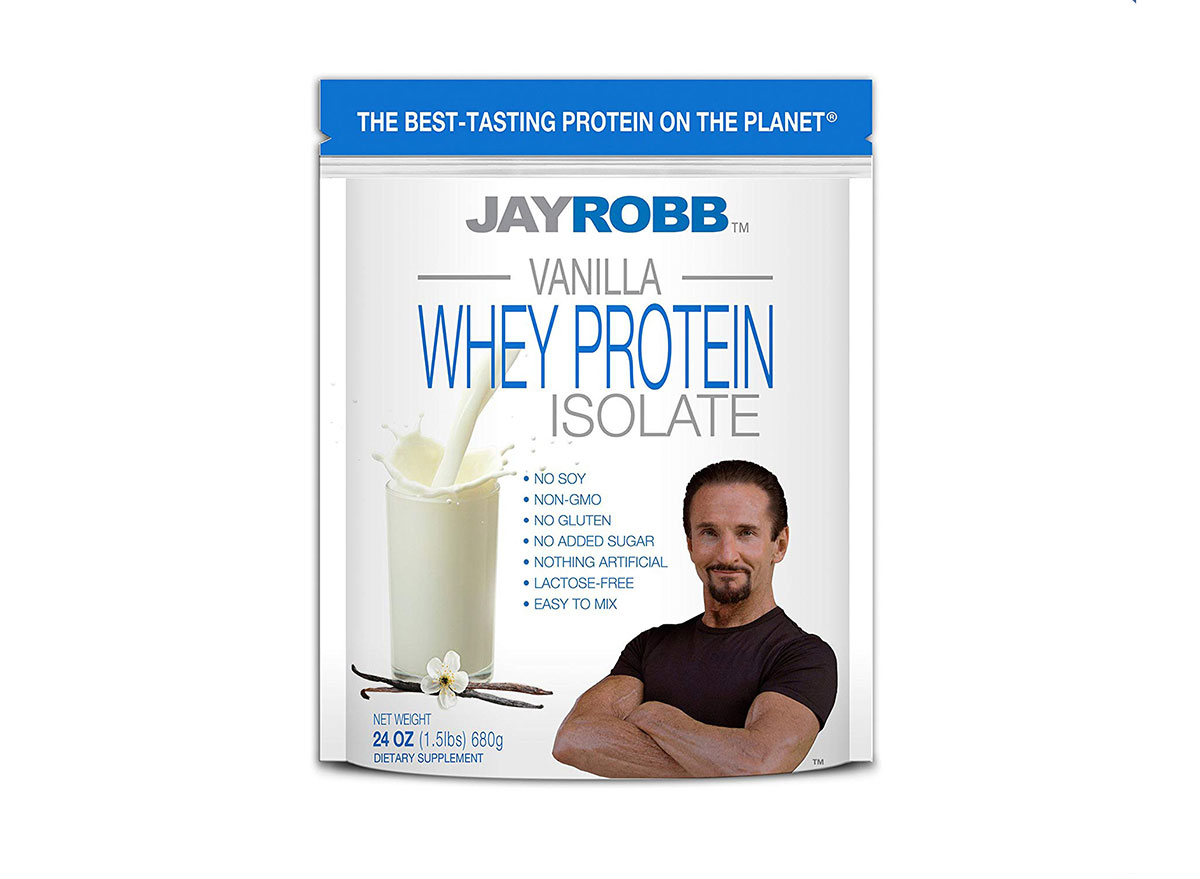
White is also a fan of this offering from the self-professed "diet guru," which has no artificial substances, no added sugar, no soy or gluten, and is lactose-free. "Finding a clean ingredient, great-tasting protein is hard to find," says White. "I like Jay Robb Whey Protein Powder because it provides a great ratio of BCCAs, while offering a lower fat and carb to high protein ratio. All of Robb's whey protein powders contain at least 25 grams of protein per serving with less than 1 gram of fat and no more than 3 grams carbohydrates.
Orgain Clean Whey Protein Powder in Vanilla Bean
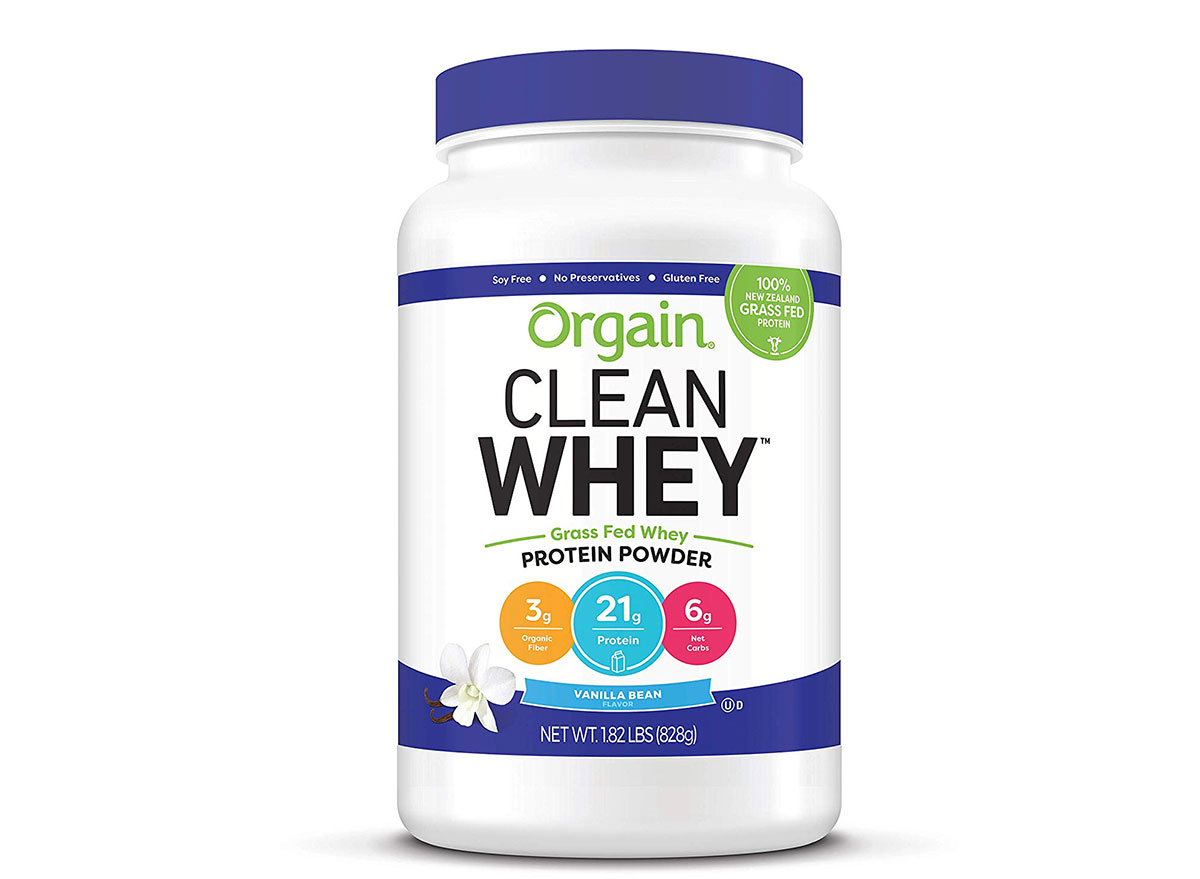
When choosing a whey protein powder, it's also crucial to pick one that has little to no added sugar and no artificial substances, such as colors, flavors, or preservatives. Believe it or not, even when keeping all of that in mind, it's still possible to find a whey protein powder that meets those qualifications and still tastes good. Jenna Appel, MS, RDN, LDN, CPT, and the owner of Appel Nutrition Inc., is partial to the vanilla bean flavor. "A serving of this powder is only 150 calories and packs in 21 grams of grass-fed whey protein," she says. "There are three grams of organic dietary fiber, which could help to keep you feeling full and satisfied, an added bonus for those with a weight loss goal."
Continues Appel: "What I like most is that there is no added sugar and no artificial colors, flavors, or preservatives, which is hard to find in a whey protein powder. This powder is versatile in that it works well in smoothies and for baking. I use it to make anything from blended organic fruit smoothies to high-protein pancakes and waffles."
Jarrow Formulas Whey Protein (Unflavored)
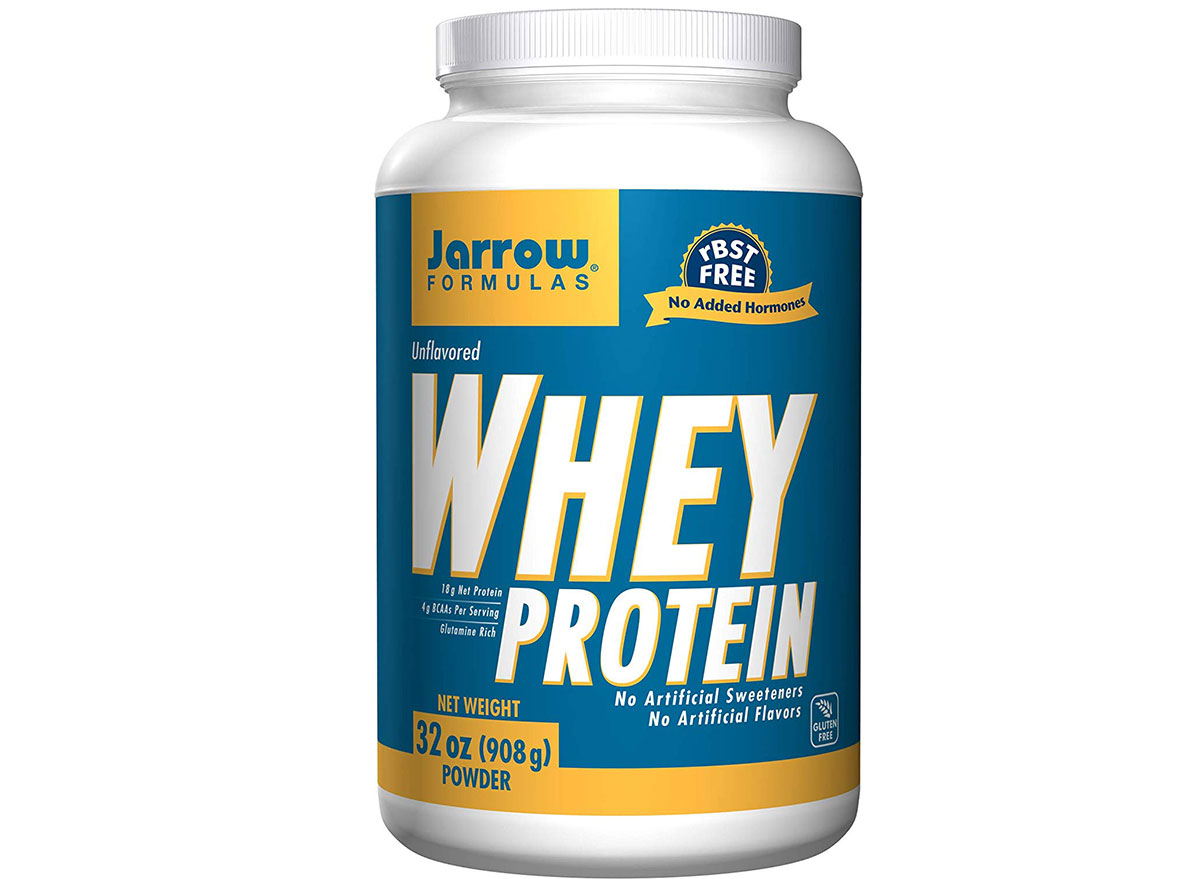
A second plain, unflavored whey protein that should be on your radar is this one from Jarrow Formulas. "Most flavored protein powders contain at least one type of artificial sweetener, which I like to avoid, despite the fact that they're considered safe," says Diana Gariglio-Clelland, RD, a dietitian at Balance One Supplements. "Plain protein powders also blend well into many different foods because the flavors don't compete with what they are combined with." Furthermore, this particular whey protein boasts 4 grams of BCAAs per serving, meaning it's a good pre-workout option to keep in mind.
BiPro Bold Whey + Milk Protein Isolate
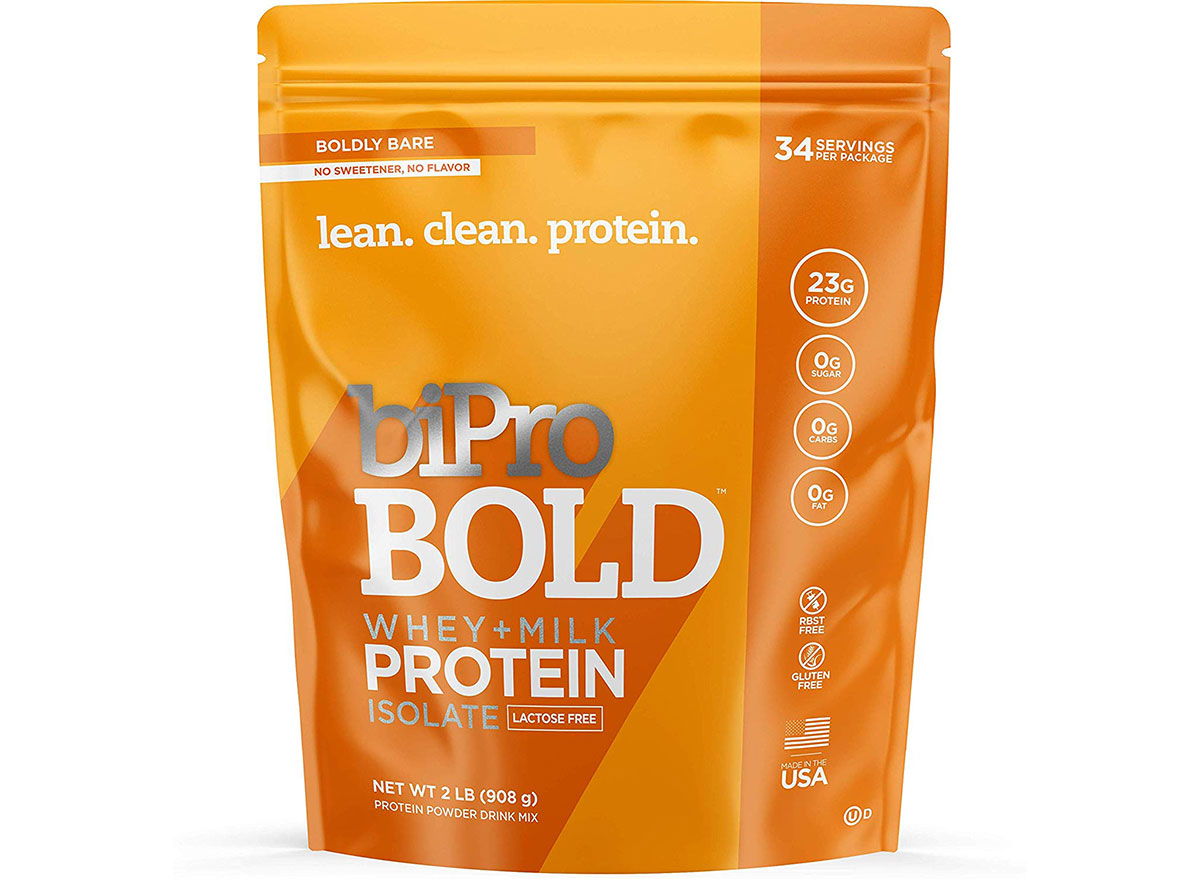
Speaking of BCAAs, BiPro has them, White says. "It has 2.5 grams of Leucine [which is one such BCAA]. Leucine is an amino acid that helps increase muscle synthesis." It also lets you feel full longer, thanks to 23 grams of lean, clean protein per serving.
And though it's not uncommon for lactose to be found in whey protein powders because it is the principal sugar (or carbohydrate) naturally found in milk and dairy, BiPro is lactose-free, making it an ideal fit for someone with stomach sensitivities. In fact, BiPro is void of all sugar and carbs, making it one of the leaniest and cleanest protein powders on the market.
Naked Whey Protein Powder
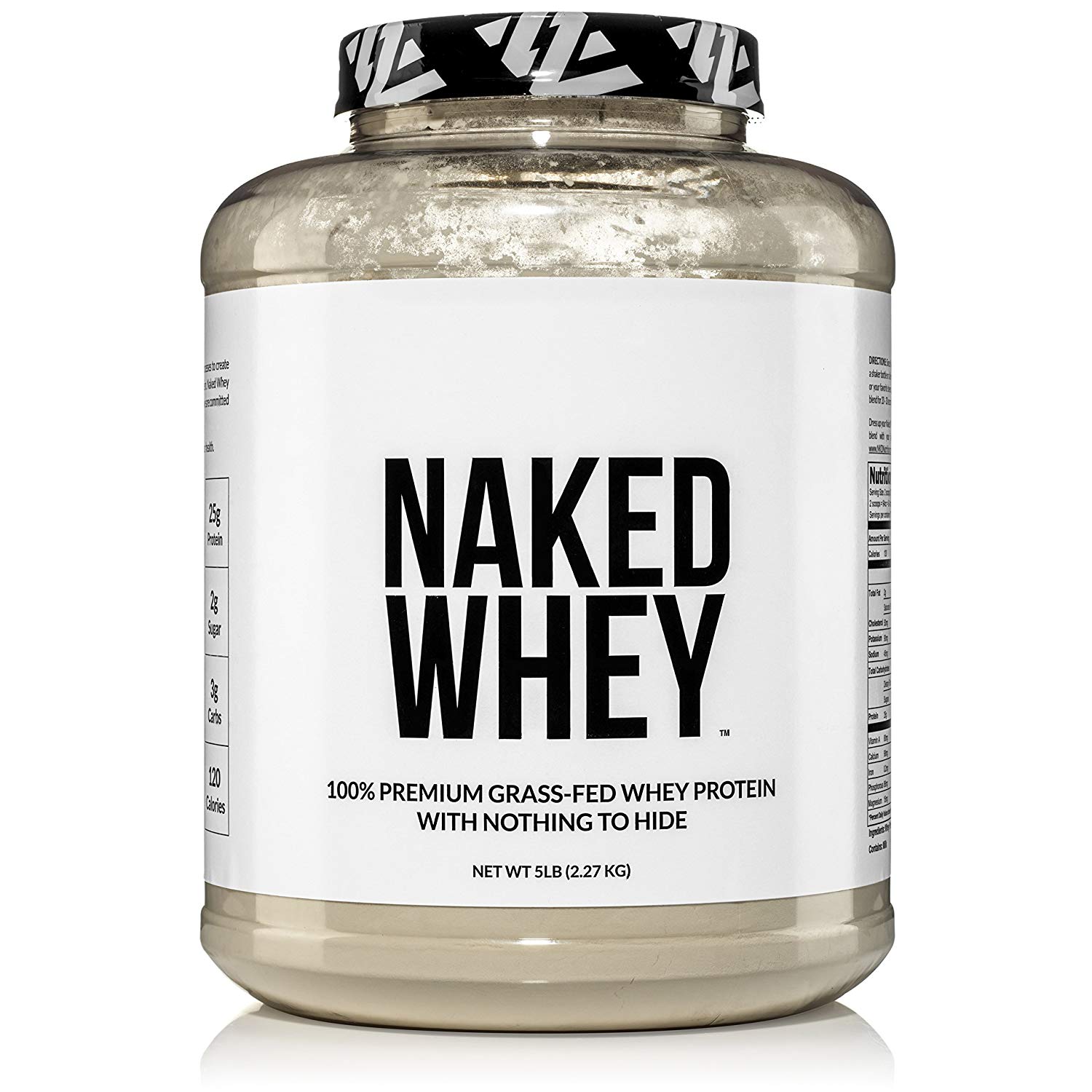
While there aren't too many to choose from, Naked Whey Protein Powder is another variety that is made from grass-fed cows' milk and contains no harmful additives. "There is only one ingredient listed in the ingredient list, and it contains zero additives," notes Appel. In other words, there are no artificial sweeteners, flavors, or colors in this whey protein powder. "Per serving, this powder delivers 25 grams of protein, only 2 grams of sugar, 3 grams of carbs, and is 120 calories," Appel says. "The powder comes in chocolate, strawberry, unflavored, and vanilla, making it easy to use in many smoothie recipes."
Gariglio-Clelland is another Naked Whey fan, thanks to the fact that this variety comes from grass-fed cow's milk and is free of artificial sweeteners. "It's also high in BCAAs, which help promote muscle growth," she adds.
Translation: This is a great option for those looking to bulk up.
F-Factor 20/20 Fiber/Protein Powder
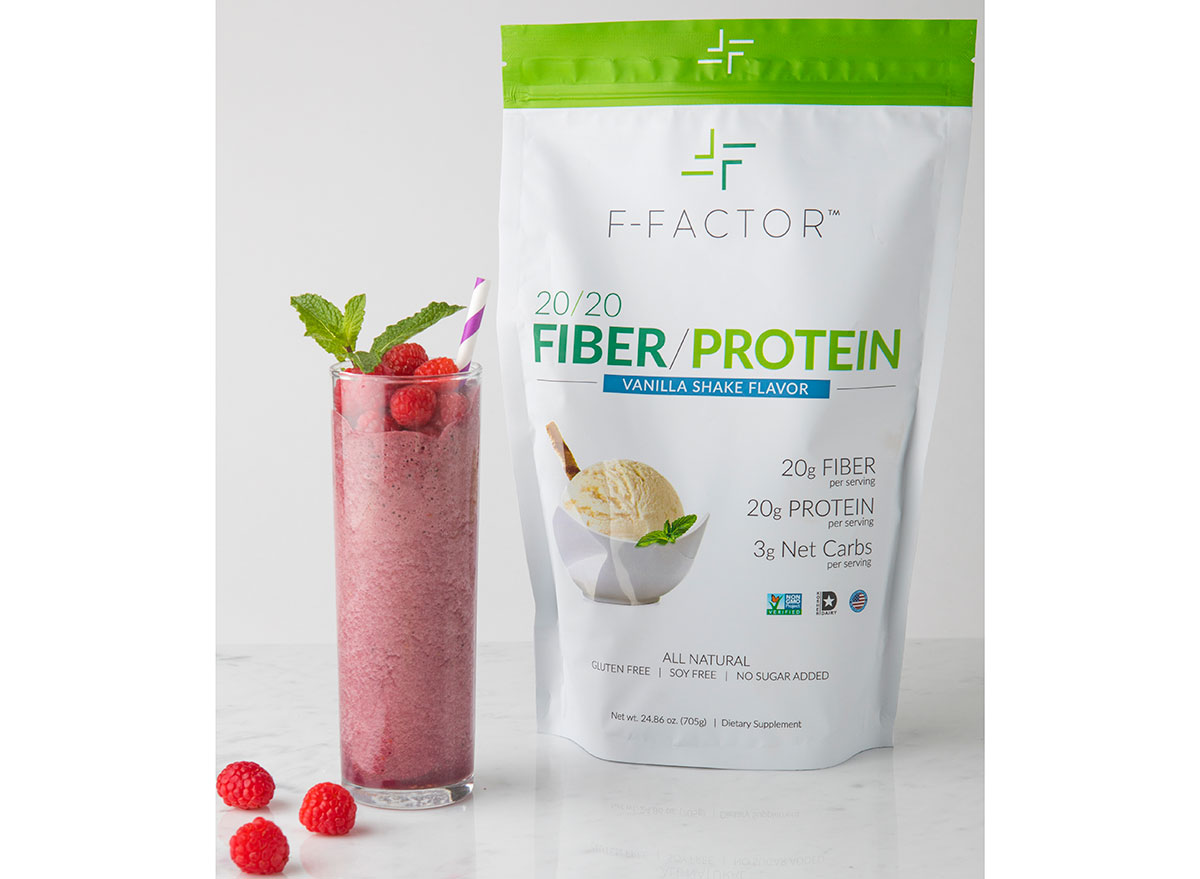
For Baker Lemein, her prefered whey protein powder comes from none other than another RD, Tanya Zuckerbrot. Zuckerbrot's F-Factor brand 20/20 Fiber and Protein powder now comes in an unsweetened, unflavored whey protein version that Lemein notes is "perfect for adding to both sweet and savory dishes and avoiding any added sugars or sweeteners."
She adds: "The ingredient list is very simple and includes 20 grams of protein and 20 grams of fiber per serving." Baker Lemein points out that while almost all Americans are eating more than enough protein compared to the recommended daily intake, almost all of us are deficient in fiber.
A protein powder that also includes fiber means you're getting a double dose of satiety—one of the main benefits of fiber. "Fiber swells in our stomach, making us fuller for longer, and aids in proper digestion, keeping us regular, and decreasing the absorption of fat and cholesterol."
SFH Pure Whey Protein Powder
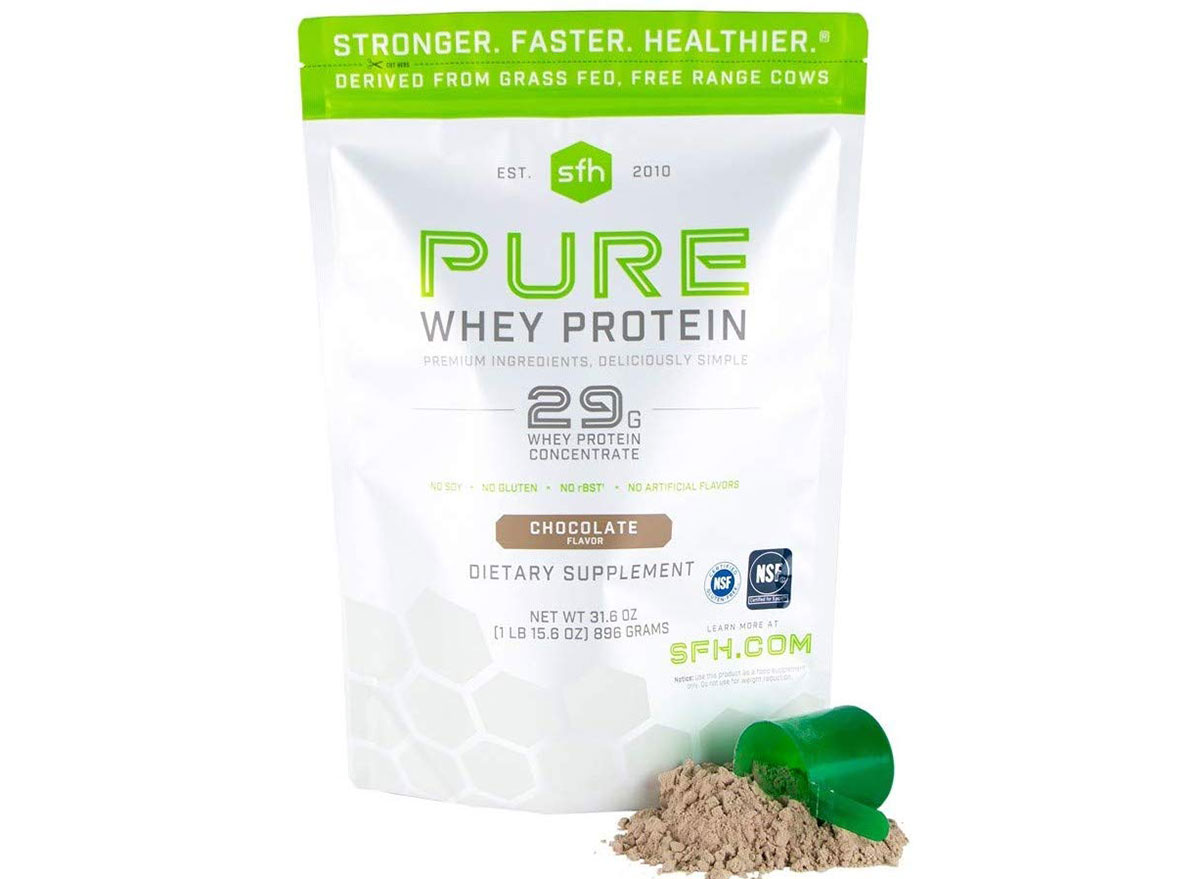
Though we've established that flavorless whey protein powders are often best because they're typically void of unhealthy additives, not all flavored versions are bad. SFH Pure Whey Protein Powder, for example, is a good option for those who need something that's not quite as bland. "It uses stevia for a sweetener, which I prefer over artificial sweeteners because it's considered natural and has been deemed safe by the FDA," says Gariglio-Clelland.
Additionally, this grass fed whey protein powder is a natural source of amino acids and has low lactose content, making it an ideal fit for those with a sensitive stomach. "Many people prefer grass-fed sources over grain-fed when it comes to meat and dairy because they contain more vitamins, minerals, and other nutrients, including omega-3 fatty acids," Gariglio-Clelland notes. "Whey protein is naturally low in lactose, which is why many people with lactose intolerance can consume it without adverse gastrointestinal side effects."
Levels 100% Grass Fed Whey Protein
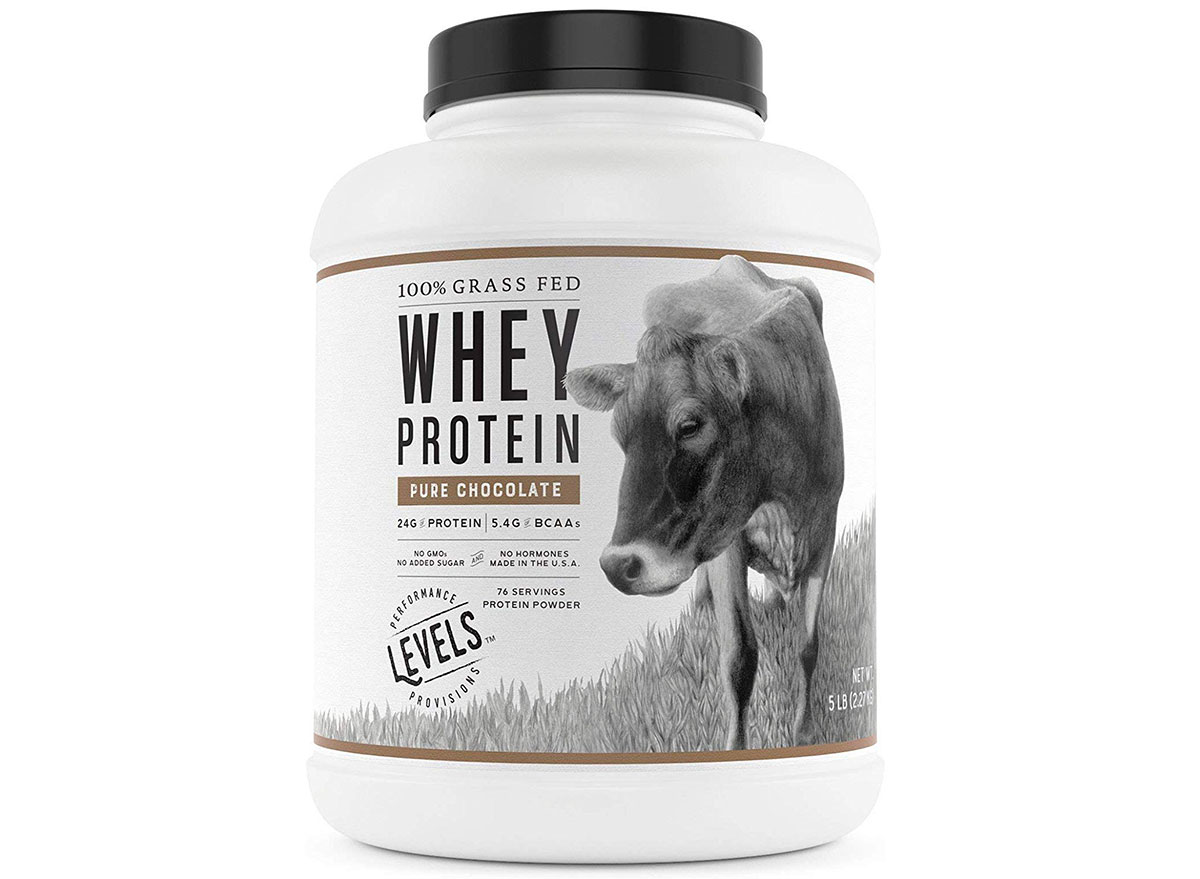
This is yet another decent flavored option that also uses stevia as well as monk fruit extract instead of artificial sweeteners. "This protein powder comes in a variety of flavors such as chocolate mocha, vanilla cinnamon, and pure chocolate, so it's a good option for those who prefer flavored protein powders," says Gariglio-Clelland. "It also comes in unflavored for those wanting to avoid any kind of sugar substitutes, artificial or natural."
Levels also includes those muscle-growing BCAAs. "BCAAs are important for muscle growth, which is why whey protein powders with enhanced BCAA content are popular for those working on improving their physical fitness and muscle development," Gariglio-Clelland says. "It's also free of soy and gluten, which can sometimes be used as fillers, so it's suitable for those sensitive or allergic to soy and/or gluten."

